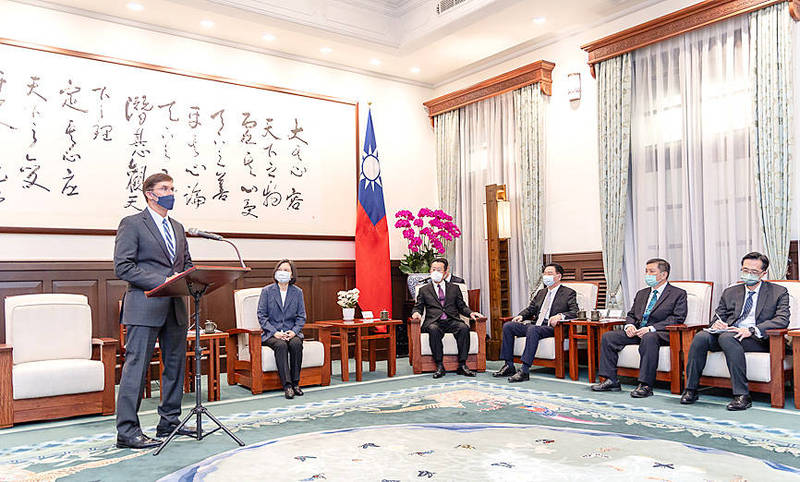《TAIPEI TIMES》US strategic clarity required, Esper says

President Tsai Ing-wen, second left, listens to former US secretary of defense Mark Esper, left, at a meeting at the Presidential Office in Taipei yesterday. Photo: Wang Yu-ching / EPA-EFE
RE-EXAMINATION: The former US secretary of defense said that the ‘one China’ policy would not be sufficient and sturdy enough to avoid conflicts in the Taiwan Strait
By Shelley Shan / Staff reporter
The US should move from strategic ambiguity to strategic clarity on cross-strait affairs and re-examine its “one China” policy, former US secretary of defense Mark Esper told President Tsai Ing-wen (蔡英文) yesterday, adding that Taiwan must demonstrate its seriousness in defending itself by increasing its defense spending.
“It is my personal view that the ‘one China’ policy has outlived its usefulness and that it is time to move away from strategic ambiguity. I think it is important that we begin that national discussion back in the US, but it will help that discussion and help us educate the American people if we can also point to bold decisions being made in Taipei, such as increase in defense spending, adoption of asymmetric warfare and corresponding capabilities, lengthening conscription and making it more rigorous, and improving reserve mobilization,” Esper told Tsai.
“It is important that the American people and our leaders in Washington see that the Taiwan people are fully committed to standing up to communist China and defending themselves as democracies of the world stand behind Taiwan,” he said.
Esper led a delegation of the Atlantic Council — a US think tank on international affairs — to Taipei on Monday for a four-day visit. In addition to Tsai, the former defense secretary met with national security officials and political party leaders to address urgent cross-strait security issues.
Esper also told a news conference hosted by the Ministry of Foreign Affairs yesterday afternoon that the “one China” policy, which Washington adopted more than 40 years ago, would not be “sufficient and sturdy enough to bear the weight of the future policies and strategies we need to pursue to avoid conflicts in the Taiwan Strait.”
China’s rise should occur within an international system with rules and norms that allow peace and prosperity for people around the world, he said.
“We cannot allow the Chinese to rise within the international system and try to dismantle it to suit their own ends, means and values,” Esper said.
Much has changed since the “one China” policy was articulated in the 1970s, he said.
“A majority of the people in Taiwan identify themselves as Taiwanese and they do not believe Taiwan is part of China,” he said. “Taiwan is now a thriving democracy with multiple transitions of power in over 20 years. It has a robust economy with two competing political parties. For all those reasons, we need to have a discussion within the US about what our policy is going forward, not one that was built on the architecture of the past.”
Taiwan would send a powerful message about the seriousness of its commitment to its own defense if its defense spending accounted for 3.2 percent of GDP, the same as the US, Esper said.
Israel, which faces a similar situation as Taiwan, has a defense budget that is close to 5 percent of GDP, he said, adding that national survival is at stake and losing a war is much more expensive than preparing for it.
Taiwan strengthening its military capabilities would not lead to conflict with China, Esper said.
“As a [former US president] Ronald Reagan Republican, I believe in peace through strength and that weakness invites aggression. If Taiwan does not strengthen its military capability, it will signal to Beijing Taiwan’s lack of capabilities and resolve to defend itself. It is critical that the country continues to strengthen its capabilities to deal with a wide range of scenarios,” he said.
The US needs to broaden its partnerships with allies to make sure Taiwan is not left to itself to deter China, he said.
Beijing could attack Taiwan if Taipei unnecessarily provokes Beijing or if the nation fails to invest in its defense capabilities, he added.
The first scenario is unlikely to happen because successive administrations in Taiwan are wise and responsible, Esper said.
“After the Chinese Communist Party Congress, China continues to suffer from a number of domestic issues. There is always the tendency by authoritarian leaders to find an external foe and create an external conflict whenever they are unable to deal with problems at home,” he said.
Esper said that “it was a mistake” that Taiwan was left out of the Indo-Pacific Economic Framework, an economic initiative launched by US President Joe Biden in March to counter the influence of the Regional Comprehensive Economic Partnership (RCEP), a trade agreement dominated by China.
“Taiwan has been an effective and responsible stakeholder in the World Trade Organization. I do not see RCEP as being a credible competitor because I do not think you can rely on the Chinese to live up to the obligations they made, which they have not done within the WTO framework,” he said. “Joining an economic framework that includes the Chinese has to leave other participants some doubt as to whether they would truly live up to their obligations and meet the terms of such an agreement.”
新聞來源:TAIPEI TIMES













